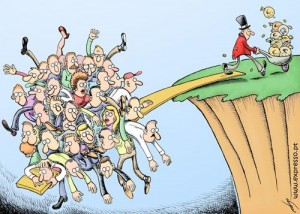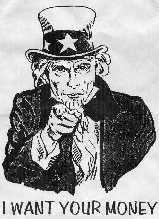Jefferson's PrinciplesBy Richard Maybury(American Socialism caused by Depressions and Wars...)
Uncle Sam, the thief, taking citizens for a ride!!!
|
This article posted at Project to Restore America.After socialism swept the world in the early 20th century, the original American philosophy was removed from the typical school. What they did with it, I don't know. Maybe it's locked in a safe in the principal's office. But I can tell you that when I was a public school teacher, no teacher I met knew anything about it. All they'd been taught about the 1776 revolution was the Marxist interpretation. They'd point to the "promote the general welfare" clause in the Constitution's preamble and say the founders were prototype New Deal democrats building a welfare state. In his first inaugural address, Thomas Jefferson listed 16 "essential principles of our government." If, like me, you were raised in government-controlled schools and colleges, I'll bet you never heard anything about them. Two of them were "peace, commerce, and honest friendship with all nations, entangling alliances with none," and "economy in the public expense." The latter gets my vote as the most thoroughly violated principle in all of world history. Jefferson said of the 16 principles, "The wisdom of our sages and blood of our heroes have been devoted to their attainment. They should be the creed of our political faith, the text of civic instruction, the touchstone by which to try the services of those we trust; and should we wander from them in moments of error or of alarm, let us hasten to retrace our steps and to regain the road which alone leads to peace, liberty, and safety." Isolationism?The founders were not isolationists, they were anti-interventionists. Jefferson's "honest friendship with all" and "entangling alliances with none" was an echo of George Washington's "great rule of conduct in regard to foreign nations." This rule was "in extending our commercial relations" and "to have as little political connection as possible." The founders wanted private individuals and organizations to go abroad and conduct friendly relations, but no political connections. Politics was seen as poison. The American RetracementIn the beginning, Americans did an imperfect but tolerable job of adhering to Jefferson's 16 principles, but then began to stray far afield. By the end of the 19th century, the federal government was solidly on the road to empire… And by the mid-20th century, it was the most powerful regime in human history, with the most extensive domain. It was a power junkie's Holy Grail. Along with this domain came the privilege of issuing a fiat dollar that is the primary currency for world trade and savings. The dollar enables the Fed to manipulate the whole world economy as if the lives and fortunes of all people are the private property of the U.S. government. It isn't just foreigners who are opening their eyes to this scam. Americans are, too. For the first time in my life, the Constitution and Jefferson's principles are becoming common topics of conversation. The Tea Party is only the most visible example. Googling "U.S. Constitution," I got 3.7 million hits. I never thought I'd live long enough to see this. I was born into a world in which the Constitution was practically a dead letter, unknown to anyone but academics and lawyers. We have begun to retrace our steps and regain the road to liberty. But I emphasize, "begun." What I call the American Retracement will take many years, and it will be a tough slog. The good news…… or part of it, is that we aren't lost and we don't need to reinvent the wheel. Unlike other nations, America isn't just a place, it's a set of ideas. These were articulated by unusually wise sages such as Jefferson who were inventing the country. We know where we are and where we've been, because we have hundreds of documents of the founders' thinking; these constitute a road map. In my opinion, the single most important belief all the founders shared was this: Writing about political power in 1787, Jefferson said to Continental Congressman Edward Carrington, "If once [the people] become inattentive to the public affairs, you and I, and Congress and Assemblies, Judges and Governors, shall all become wolves." The founders' most important work was in devising mechanisms to limit this power and make government service a maddening experience for power junkies. Their crucial invention was the Constitution. Was it flawless? Certainly not. But it worked better than anything else I've seen. It gave rise to the most advanced civilization in history, until the Great Depression and World War II. That 15-year period of error and alarm was used by power junkies to twist the Constitution into their most useful tool for accumulating and using power. The so-called libertarian Amendments, the 9th and 10th, were essentially erased. The way to untwist the document is to study the speeches and writings of the people who wrote it to learn their true intent. They were not infallible gods, but their thinking was far deeper than that of any of today's political hacks. A single James Madison is worth a thousand Bushes and Obamas. The coming trials and tribulationsSo there you have it. In the late 1800s, America took the Roman road instead of the road to liberty, and now I think the evidence shows that what I call the American Retracement has arrived. The federal government's empire is crumbling, and American civilization will revive. But, if I am right about all this, the transition will take years, and it will be hard. I will do my best to help get you through the trials and tribulations as comfortably and profitably as possible. As Thomas Paine wrote in 1776, "These are the times that try men's souls." We will eventually regain the road that leads to peace, liberty, and safety, but not easily. The more people who are familiar with the principles of the American founders, the faster and easier the job will be. If you think I may be right about the fall of the empire and the American Retracement, I hope you will help spread the word.
Regards, Richard Maybury
|

